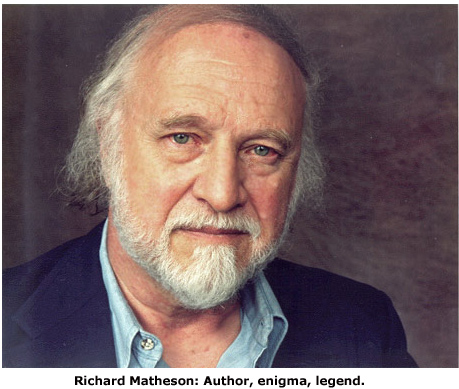
Several of his stories and novels have been adapted into television shows and films, including I Am Legend (1954), "Steel" (1956, adapted as Real Steel), The Shrinking Man (1956), A Stir of Echoes (1958), "Duel" (1971), "Button, Button" (1974, filmed as The Box), Bid Time Return (1975, Somewhere in Time), and What Dreams May Come (1978). He also wrote scripts for several Twilight Zone episodes, including the famously shocking "Nightmare at 20,000 Feet" (1963 and remade in 1983). Matheson continues to write today; one of the anthologies I read included two of his recent stories, one from 2009 and one from 2010. But he seems to have slowed down his rapid production quite a bit in the last few years.

Here's a sampling of the types of stories he writes: A woman is told she will be given $50,000 if she presses a button on a box which will result in killing someone she doesn't know, a man goes to a funeral home and makes arrangements for his not-yet-deceased wife, a man searches for the origins of dirty jokes and finds a secret society, a family prepares to live in an underground tunnel system as a result of an impending nuclear attack, a young girl shows her friend a possessed dress belonging to her deceased mother, a scientist travels back in time to witness the crucifixion of Jesus, a man discovers he has a double, large groups of people walk into the Pacific Ocean and drown for an unknown reason, a young man discovers that being a gunslinger in the Old West is far more difficult than he ever imagined.
I like Matheson because he is first and foremost a good story teller. He knows how to begin and end stories well, and many of the stories have surprising "twist" endings (often a bit like the ending in Shirley Jackson's "The Lottery"). And he is a pretty good writer of sentences. He's no Cormac McCarthy or Joseph Conrad, but he's not trying to be poetic and dense either. He writes with a natural rhythm with often surprisingly sophisticated diction that doesn't get in the way of his rapid pacing.

What I like most about his works is his emphasis, and this isn't always the case but often is, on ideas, on moral questions and unsolvable dilemmas. For instance, I Am Legend raises lots of interesting questions, some directly, some indirectly: if you were the last human on earth, would it be better to die than live alone? Is sexual desire and consummation an essential quality of the human condition? What is the worth of human life? How much effort would you put into saving your own life? Do we have control over our desire for vengeance? Similar types of questions could be asked in relation to "Button, Button": Is it morally right to will the death of an innocent person? Is there a price on innocent suffering? How well do we know our spouses and family members?
Of course, Matheson doesn't answer these questions. He is not completely ambiguous in his leanings, though. His overall vision seems pretty dark. Matheson's world is a world where innocent people suffer for no real reason. It's a world of pain, of darkness, of pure evil, where terrible monsters lurk, where people betray their families and spouses, where you can't rely on the compassion of others, where machines and mankind itself is working against you and there is nothing you can do to stop it from coming. But it is also a world of the individual, a kind of dark and realistic Ayn Randian vision (as opposed to her romantic individualism). For Matheson, the individual can will himself to survive or fight, and he can accomplish great things, but it's usually only temporary. Eventually, the individual loses. In this way, Matheson is like a Greek tragedian. His characters are caught up in a world that is out of their control, and there is no winning or escaping. But like many of the Greek characters, there is something noble in Matheson's characters attempts to do the impossible. To persevere in a world where the deck is stacked against them.

